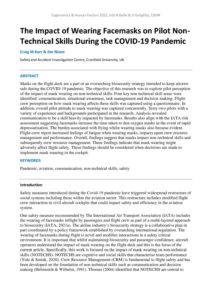| Document | Author Craig M Kerr & Jim Nixon |
| Abstract Masks on the flight deck are a part of an overarching biosecurity strategy intended to keep aircrew safe during the COVID-19 pandemic. The objective of this research was to explore pilot perception of the impact of mask wearing on non-technical skills. Four key non-technical skill areas were identified: communication, situational awareness, task management and decision making. Flight-crew perception on how mask wearing affects these skills was captured using a questionnaire. In addition, overall pilot attitude to mask wearing was captured concurrently. Sixty-two pilots with a variety of experience and backgrounds participated in the research. Analysis revealed communication to be a skill heavily impacted by facemasks. Results also align with the IATA risk assessment suggesting facemasks increase the time taken to don oxygen masks in the event of rapid depressurisation. The burden associated with flying whilst wearing masks also became evident. Flight-crew report increased feelings of fatigue when wearing masks, impacts upon crew resource management and performance. Overall, findings suggest that masks impact non-technical skills and subsequently crew resource management. These findings indicate that mask wearing might adversely affect flight safety. These findings should be considered when decisions are made to implement mask wearing in the cockpit. |

